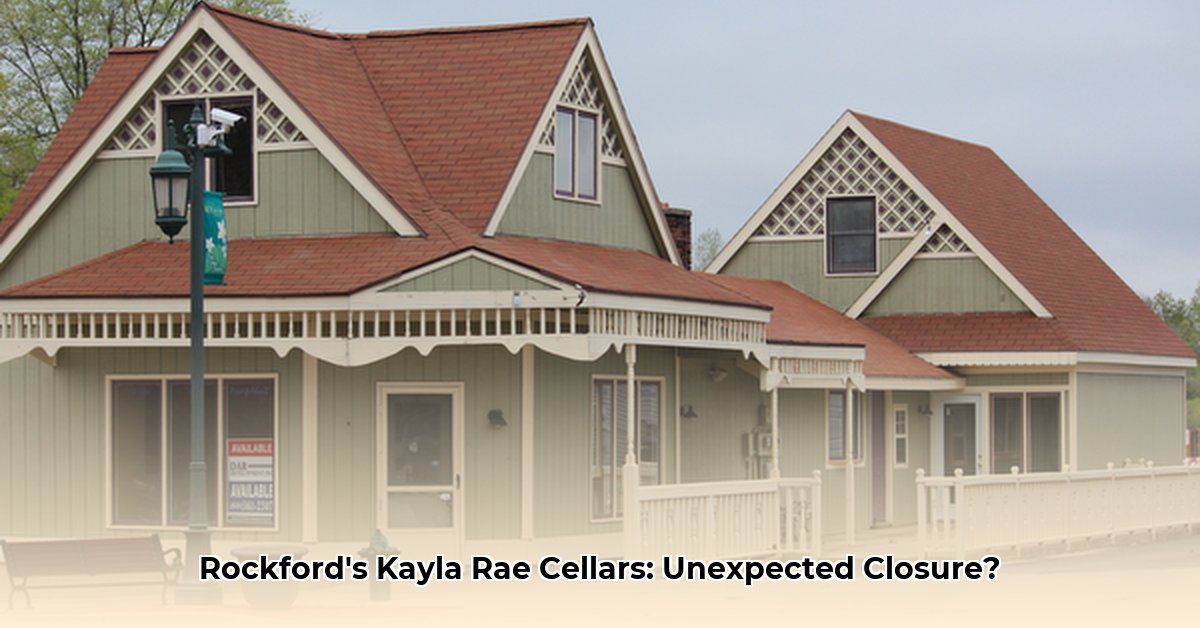
Kayla Rae Cellars Rockford: A Local Winery's Closure and its Economic Ripple Effect
The recent closure of Kayla Rae Cellars and another unnamed winery in Rockford, Illinois, has raised concerns about the future of the local wine industry and its broader economic impact. This event signifies more than just the loss of two businesses; it highlights the vulnerabilities of smaller wineries in the face of economic pressures and shifting consumer preferences. Understanding the causes and consequences of these closures is crucial for securing the future of Rockford's remaining wineries.
More Than Just Wine: Kayla Rae Cellars and the Unnamed Winery
Kayla Rae Cellars distinguished itself by offering a diverse product portfolio, including craft beers and alcoholic slushies, in an attempt to attract a broader customer base. This innovative strategy, while potentially beneficial, proved insufficient to ensure long-term viability. Details surrounding the closure of the second winery remain limited, preventing a complete comparative analysis. The absence of comprehensive financial data for both wineries hinders a definitive determination of the specific factors leading to their closures.
Potential Contributing Factors to the Closures
Several factors likely contributed to the closures. Economic headwinds in Rockford, potentially reflected in the closure of other local businesses, may have reduced consumer spending on discretionary items like wine. Increased competition from larger wineries, possessing greater marketing reach and distribution networks, presents a significant challenge for smaller players. Furthermore, internal factors, such as unforeseen expenses or management decisions, could have played a significant, albeit currently unquantifiable, role. Without access to detailed financial records, these remain plausible yet unproven hypotheses. Could the closures signal a broader trend affecting small wineries in similar regions? Further research is needed to determine this decisively.
The Fallout: Impacts on Stakeholders
The closures have wide-ranging implications. Remaining wineries in Rockford now face intensified competition and increased pressure to maintain profitability. The city government experiences a loss of tax revenue, potentially impacting tourism and the overall economic health of the community. Consumers face a reduction in the variety of locally produced wines available.
A Larger Trend? The Need for Further Research
The closures raise questions about regional trends. Is this a localized phenomenon, or does it reflect broader challenges faced by small wineries in Illinois or similar regions? Further investigation is critical to understanding the extent of the problem and informing effective policy responses. A comprehensive study involving interviews with winery owners and financial data analysis could provide crucial insights. Did changing consumer preferences or regulatory changes significantly impact these wineries’ ability to remain competitive?
Looking Ahead: Adaptability, Support, and Further Study
The closure of Kayla Rae Cellars and its counterpart serve as a stark reminder of the challenges facing small businesses. Adaptation and innovation are paramount for survival. Stronger support from local government and consumers is crucial. Initiatives to foster collaboration among wineries and promote the Rockford wine region could help mitigate future losses and ensure the sustainability of the local industry. This requires a concerted effort involving policy makers, business owners, and consumers alike. What innovative business models can be explored by smaller wineries to ensure resilience?
Assessing the Risks: A Preliminary Risk Assessment
The table below presents a preliminary risk assessment matrix illustrating potential risks impacting Rockford wineries. Further research and more detailed data are needed for a comprehensive analysis.
| Risk Factor | Likelihood | Impact | Potential Mitigation Strategies |
|---|---|---|---|
| Economic Downturn | Moderate | High | Diversify revenue streams; establish financial reserves; explore grants/loans. |
| Increased Competition | Moderate | Moderate | Enhance brand identity; focus on niche markets; pursue strategic partnerships. |
| Shifting Consumer Tastes | Moderate | Moderate | Adapt product offerings; leverage effective marketing; explore diverse distribution. |
| Regulatory Changes | Low | Moderate | Ensure compliance; participate in industry advocacy; proactively adapt to changes. |
This analysis underscores the need for continued research to develop a comprehensive understanding of the issues at hand and devise effective strategies to support the Rockford wine industry. What specific policies could local government implement to foster economic growth and sustain small wineries?
How to Prevent Winery Closures in Rockford: A Call to Action
The closure of Kayla Rae Cellars provides valuable lessons. Effective business planning, rigorous market research, diversification of revenue streams, and strong community engagement are crucial for the sustainability of Rockford wineries. Collaboration among businesses and proactive adaptation to changing economic and consumer landscapes are paramount for future success.